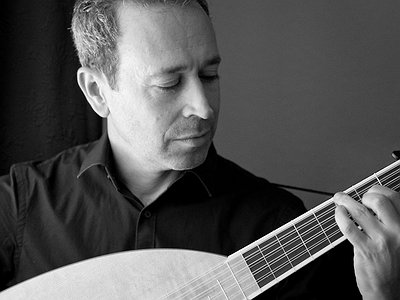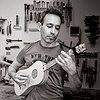Part 2
Take us through a day in your life, from a possible morning routine through to your work, please. Do you have a fixed schedule? How do music and other aspects of your life feed back into each other - do you separate them or instead try to make them blend seamlessly?
Practicing is one of the biggest pleasures for me as a musician. I enjoy exercising (experiencing / contacting) this potential for growth. Everything in this phase is still shifting, forming, taking shape. Nothing is fixed yet, and the results are not that important. The process is important. Very Zen.
As a lute player I find myself participating in a variety of different projects. Sometimes I'll be on a 3-week tour with an orchestra, and sometimes staying in another city - like Groningen, for a project of chamber music. So the schedule varies.
But when I'm at home I would usually try to maintain a schedule that includes house-hold tasks such as cleaning, going to the market, cooking, exercising (gym, chi-kung, yoga) next to the daily practice which would sometimes spread out over the whole day. Physical exercise is a very important element in my life. It helps me reconnect to my body, and get out of my thoughts. There's always something on my mind, so training helps maintaining a physical well being as well as mental. And it helps preventing professional injuries as well. During the Covid crisis this schedule has stabilized and became very welcome.
Can you talk about a breakthrough work, event or performance in your career? Why does it feel special to you? When, why and how did you start working on it, what were some of the motivations and ideas behind it?
A very important event that occurred to me during the past few years was meeting German guitar player Frank Bungarten.
Frank approaches technique like a scientist – using intense observation, analysis and a unique practice-methodology to reach the highest level of accuracy, security and stability in playing. This stability enables freedom in musical expression. This approach was right down my alley, and came at the right time – as I felt that my own way of practice was not leading to the results I was looking for. Through several meetings with Frank, I've gained many new insights about almost all aspect of lute playing.
I'll give you one example: what does it mean to move a finger in order to press a note on the lute's fingerboard? We were always taught that the finger is hovering above the string, in a relaxed position – and then moving actively towards the fingerboard. Frank showed me that it is actually the contrary. The finger should be placed relaxed on the fingerboard (grounded) pressing a string. Then it actively lifts when releasing the sound. It's revolutionary. Playing like that creates constant relaxation and a feeling of being grounded.
The way I practice since I've met Frank are similar to the way people practice Chi-Kung, Tai-Chi or martial arts. It has to do with the basic movement and our physiology. Lute-ninja if you'd like. (laughs)
There are many descriptions of the ideal state of mind for being creative. What is it like for you? What supports this ideal state of mind and what are distractions? Are there strategies to enter into this state more easily?
My daily goal is to create the ideal conditions for practice. These ideal conditions are having a “clear table” which in turns means that there's a list of errands, tasks and non related issues that need to be finshed first. I could then start working. Usually starting dry excersizes for the left or right hand. I would often do that with some meaningless Netflix series in the background. This helps making practice less serious and heavy. At a certain moment I'll be immersed in the practice, turn off Netflix, and concentrate on the piece – looking for technical impovements, or working on micro-timing, renaissance inégalité (a Baroque term I like to use for earlier music as well) and in search for the perfect upbeat.
Sometimes I'll just play through new material (there's plenty of lute music available online – both manuscripts and early publications) and be inspired by the freshness of unknown pieces. But most of the time I would work on a small number of pieces over a very long period. There's a fantasia by Francesco Da Milano which I've been practicing for the past 3 years. I still discover new things and improve fingering and voice-leading. Work in progress. (laughs)
Music and sounds can heal, but they can also hurt. Do you personally have experiences with either or both of these? Where do you personally see the biggest need and potential for music as a tool for healing?
When I read this question I can think of two different cases where music can hurt. One – when there's disharmony (being out of tune, for example), and the other occurs when conflicts arise between musicians while making music. I think it's only natural for both to happen. Musicians generally strive for perfection, so their reaction to imperfection is strong and from the guts. When collaborating with artists, we all arrive with our own set of beliefs and our professional knowledge, as well as our personalities and shortcomings. So unsurprisingly egos often get hurt when conflicts arise.
For me, making music with other people is like a constant give and take where there's mutual feedback and attentive listening. There's harmony (not only musical, but interpersonal) where people appreciate each other and relate to each other. I can get quite upset if a fellow musician suddenly ignores our musical agreements and stops listening. Listening, in all its aspects, is key when making music together.
I know that music can heal (maybe it has even been proven), but I would not use this verb myself. I would rather speak about a state of well-being where music is the means of touching a different experience on this earth. I tried to read a couple of books that speak about music from an anthropological or neurological view, to understand what it does to our brain when we listen to music, but somehow lost interest during the first chapters. I can't explain it – that thing that happens when we listen to music. But I guess it doesn't really matter – it's sublime, and it's what makes me feel connected to being alive.
When I write this, it sounds like a cliché. I guess many truths become clichés when numerous people repeat them. But for me listening to music, understanding it and practicing it is like a kind of prayer where music fills in the space, and just exists – present, for itself. When I experience this, I can say that it brings me into a state of well-being.
Our sense of hearing shares intriguing connections to other senses. From your experience, what are some of the most inspiring overlaps between different senses - and what do they tell us about the way our senses work? What happens to sound at its outermost borders?
I have not really given thought to music in regards to the other senses. I'm not sure this is something I can comment about. Sometimes people associate chords with colors. For example - a minor chord is red and a major chord is blue. I can understand where that comes from – the difference between the two is big and distinct. But I think such comparisons eventually come to compensate for a lack of other means to describe the minor-ness and te major-ness of the chords.
Having said that, maybe there's one case where I have compared music to, in the past: food. Some solo harpsichord pieces by Jacques Duphly and Louis Couperin are so rich and intense that listening to them reminds me of the sensation when eating a very rich tomato sauce. Check this out:
Art can be a purpose in its own right, but it can also directly feed back into everyday life, take on a social and political role and lead to more engagement. Can you describe your approach to art and being an artist?
I'm fascinated by human development from prehistoric times – the evolution of man, and the birth of consciousness that lead to the rise of civilization. In his book “Ishmael”, Daniel Quinn claims that the agricultural revolution - some 11,000 years ago, marks the moment when we (the human race) parted from the animal realm or “natural way of things”, and started changing the environment, which resulted in ecological imbalance. In other words – we used to be much more connected to our true nature - being part of natural world. Throughout the ages, with the development of (Western) culture, we have lost a fundamental connection with ourselves. And yet it is this same culture which created this most sublime thing there is – art. For me this is a fascinating paradox. If anything, it is from this paradox that art could effect real daily life. We need to eat, sleep, reproduce, find shelter. Why on earth do we need art?
On a personal level, I connect to this aspect of music - being outside of daily life and our basic needs. And at the same time it is my raison d'etre – a yearning for a place of Unity.
What can music express about life and death which words alone may not?
I think that my answer from the previous question is relevant here as well. Music has a quality of being out of this world. In Sufi tradition there is talk of “The Unity of Existence” where there is only One. Unity is the true essence of the world, but People, in their ignorance, see the world as a multitude of separated things (you, me, them, good, bad, life, death).
Playing the Ney (a Persian flute made of reed) can evoke this memory of a place/time where we knew (know) the true nature of things, and experience the Unity. So, for me, music itself is a glimpse of the absolute, or the “truth” or something beyond life and death.






